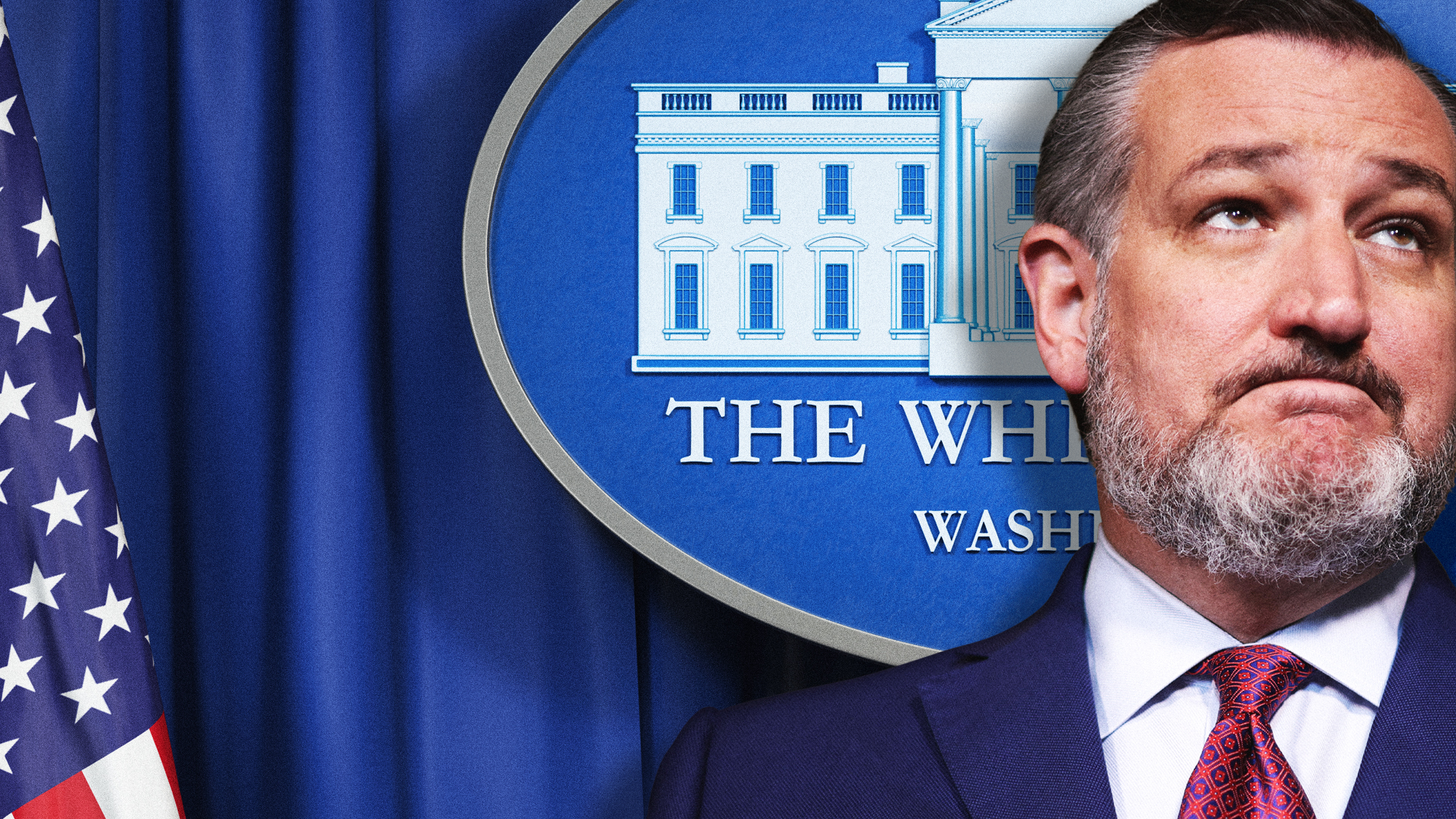Hawley and Cruz: How to lie without quite lying
These Republican senators will object to finalizing Biden's election. Why? Because, they say, lots of Republican voters believe a lie.


A free daily email with the biggest news stories of the day – and the best features from TheWeek.com
You are now subscribed
Your newsletter sign-up was successful
For Republicans in Congress planning to vote Wednesday against certifying Joe Biden's presidential election victory, the lie has become its own justification.
The lie is that Donald Trump was deprived of re-election due to fraud or some other shenanigans. Numerous courts have rejected those allegations, and the Justice Department hasn't found any evidence of wrongdoing widespread enough to overturn the election results. The president and a few of his nuttier allies keep flogging claims that the election was stolen — and Trump might even believe his own lies about the election, if we're to believe the recordings of his weekend phone call where he pressured Georgia Secretary of State Brad Raffensperger to "recalculate" that state's voting results. But there is no reason to believe that is true. Given Trump's history of crying wolf whenever he doesn't win, there is plenty of reason to believe he is running his usual con.
Nonetheless, Sens. Josh Hawley (R-Mo.), Ted Cruz (R-Texas), and others will object to finalizing Biden's election. Why? Because — they say — lots of Republican voters believe the lie.
The Week
Escape your echo chamber. Get the facts behind the news, plus analysis from multiple perspectives.

Sign up for The Week's Free Newsletters
From our morning news briefing to a weekly Good News Newsletter, get the best of The Week delivered directly to your inbox.
From our morning news briefing to a weekly Good News Newsletter, get the best of The Week delivered directly to your inbox.
"Millions of voters concerned about election integrity deserve to be heard," Hawley said in a tweet announcing his intentions. "I will object on January 6 on their behalf."
A statement released Saturday by Cruz and some of his fellow Republican senators offered a similar justification.
"By any measure, the allegations of fraud and irregularities in the 2020 election exceed any in our lifetimes," they wrote. "And those allegations are not believed just by one individual candidate. Instead, they are widespread. Reuters/Ipsos polling, tragically, shows that 39 percent of Americans believe 'the election was rigged.' That belief is held by Republicans (67 percent), Democrats (17 percent), and Independents (31 percent)."
Trump himself parroted that premise in his phone call with Raffensperger.
A free daily email with the biggest news stories of the day – and the best features from TheWeek.com
"The people of Georgia are angry, the people in the country are angry," he said. "And there's nothing wrong with saying, you know, um, that you've recalculated."
You will notice that for the most part, Trump's Republican allies don't quite affirm the substance of the lie — they don't present any evidence to support allegations of wrongdoing, no real reason to believe that Joe Biden's election was anything but fairly and honorably won. Instead they cite the widespread (and wrongheaded) belief in wrongdoing as justification to upend our democracy.
What a cute trick.
The reason so many Americans — particularly Republicans — believe the election was rigged is because Trump keeps lying to them and telling them the election was rigged. That so many people have swallowed the president's falsehoods allows Hawley and Cruz to pose as defenders of the democratic ideal while simultaneously undercutting it. But it also has the effect of letting them magnify the lie and its potential consequences without doing anything so tawdry as lying themselves. It is a form of plausible deniability, a version of "just asking questions" that keeps untruths in play without taking responsibility for them.
This is wrong and shamefully cynical.
"He surely knows this isn't true and that the legal arguments don't hold water," an anonymous source close to Hawley told The Atlantic's Peter Wehner. "And yet clearly the incentives he confronts — as someone who wants to speak for those voters, and as someone with ambitions beyond the Senate — lead him to conclude he should pretend the lie is true."
Not every Republican is on board with these efforts. Raffensperger, for example, held fast against Trump's pressure by simply and repeatedly — even respectfully, though it wasn't warranted — affirming the truth. "Mr. President," he said, according to the recording, "the challenge that you have is, the data you have is wrong."
Pretty simple, right?
We have seen this kind of Hawley-Cruz-style cynicism in the not-too-distant past. In 2011, then-House Speaker John Boehner rejected the notion that he and other Republican leaders should vigorously challenge the falsehood — widespread among GOP voters — that Barack Obama had been born abroad and thus held the presidency against the Constitution's requirements.
"It's not my job to tell the American people what to think," Boehner said.
It should be the job of elected leaders to tell their constituents the truth, however. As it happened, the chief proponent of the birther lie against Obama was Donald Trump. Elected Republican elites never quite endorsed his crusade, but they did allow themselves to benefit from it and the way it stirred up the passions of their base. Mitt Romney, who has criticized Hawley and Cruz's efforts, happily accepted Trump's endorsement for president in 2012, a step toward cementing the notion of Trump as a plausible political figure. When you don't counteract a lie with truth, it seems, the lie can keep growing until it overwhelms and controls you — becomes something that you don't just passively accept for advantage, but which becomes your reason and justification for action. So it goes with today's Republican Party.
Joel Mathis is a writer with 30 years of newspaper and online journalism experience. His work also regularly appears in National Geographic and The Kansas City Star. His awards include best online commentary at the Online News Association and (twice) at the City and Regional Magazine Association.
-
 Bad Bunny’s Super Bowl: A win for unity
Bad Bunny’s Super Bowl: A win for unityFeature The global superstar's halftime show was a celebration for everyone to enjoy
-
 Book reviews: ‘Bonfire of the Murdochs’ and ‘The Typewriter and the Guillotine’
Book reviews: ‘Bonfire of the Murdochs’ and ‘The Typewriter and the Guillotine’Feature New insights into the Murdoch family’s turmoil and a renowned journalist’s time in pre-World War II Paris
-
 Witkoff and Kushner tackle Ukraine, Iran in Geneva
Witkoff and Kushner tackle Ukraine, Iran in GenevaSpeed Read Steve Witkoff and Jared Kushner held negotiations aimed at securing a nuclear deal with Iran and an end to Russia’s war in Ukraine
-
 The billionaires’ wealth tax: a catastrophe for California?
The billionaires’ wealth tax: a catastrophe for California?Talking Point Peter Thiel and Larry Page preparing to change state residency
-
 Bari Weiss’ ‘60 Minutes’ scandal is about more than one report
Bari Weiss’ ‘60 Minutes’ scandal is about more than one reportIN THE SPOTLIGHT By blocking an approved segment on a controversial prison holding US deportees in El Salvador, the editor-in-chief of CBS News has become the main story
-
 What Nick Fuentes and the Groypers want
What Nick Fuentes and the Groypers wantThe Explainer White supremacism has a new face in the US: a clean-cut 27-year-old with a vast social media following
-
 Ted Cruz teases big 2028 moves
Ted Cruz teases big 2028 movesIN THE SPOTLIGHT The Texas Republican is playing his cards close to his chest, even as others in Washington start looking for hints about the arch-conservative’s future
-
 Has Zohran Mamdani shown the Democrats how to win again?
Has Zohran Mamdani shown the Democrats how to win again?Today’s Big Question New York City mayoral election touted as victory for left-wing populists but moderate centrist wins elsewhere present more complex path for Democratic Party
-
 Millions turn out for anti-Trump ‘No Kings’ rallies
Millions turn out for anti-Trump ‘No Kings’ ralliesSpeed Read An estimated 7 million people participated, 2 million more than at the first ‘No Kings’ protest in June
-
 Ghislaine Maxwell: angling for a Trump pardon
Ghislaine Maxwell: angling for a Trump pardonTalking Point Convicted sex trafficker's testimony could shed new light on president's links to Jeffrey Epstein
-
 The last words and final moments of 40 presidents
The last words and final moments of 40 presidentsThe Explainer Some are eloquent quotes worthy of the holders of the highest office in the nation, and others... aren't
